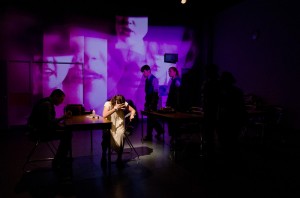“Adding Machine: A Musical” are the words headlining the program for Todd Theater’s most recent production directed by Nigel Maister, artistic director of the UR International Theater program, though “musical” seems like an understatement. Perhaps “operetta” would be a more appropriate term, since there are only a handful of lines that are not sung, much in the fashion of musicals like “Les Miserables.” However, if ticket buyers expect to see a stereotypical musical, they should prepare to be suprised.
Whereas when leaving the theater after most musicals the final song of the show undoubtedly repeats itself in audience members’ brains, the primary theme of “Adding Machine” remained in my head for about five minutes, then faded away. Although most of the show was fantastic, the score did not leave a lasting impression.
The sparse instrumentation of piano, keyboard and percussion paired with complex, repetitive, and staccato rhythms that consumed the majority of the music made many of the compositions seem almost like minimalist works, though there were a few exceptions, primarily in the music of Daisy, played by freshman Zoe Netter, and Shrdlu, played by junior Chris Urquiaga, in which composer Joshua Schmidt invoked 1920s jazz club and gospel styles
The score alone did not cause “Adding Machine” to thwart customary expectations of musical theater, though. The plot also remains oddly unresolved at the play’s end and did not outline a traditional story line by any means. Mr. Zero, played by KEY Scholar Andrew Polec, held a job adding numbers together for eight hours a day. On his twenty-fifth anniversary of work, his boss, played by sophomore Jacob Goritski, surprises him by replacing him with an adding machine. This event spurs Zero to murder his boss, which lands him in jail, sentenced to execution.
Upon dying, Zero unexpectedly reaches the Elysian Fields where he reunites with his previous crush and coworker, Daisy, as well as his ex-prison mate, Shrdlu. After Zero and Daisy exchange some touching love confessions — including Zero revealing he pressed his knee against Daisy’s one time “accidental, on purpose” — it seems as though this is an opportunity for the second life Zero had dreamed of, free from his nagging wife, Mrs. Zero (senior Katie Lewis).
Yet, when it seems as though everything will fall into place for Zero, he panics, unable to forget the mistakes he made in the past, and simultaneously, unwilling to fully remember them. Rather, Zero finds solace in his numbers that have always remained constant in his life, affirming to himself, “Now this is freedom. I don’t hear no voices running around in my head.”
Not surprisingly coming from Todd Theater staff, Maister, Set and Costume Designer Marsha Ginsberg, Lighting Designer Thomas Dunn, and Video Designer C. Andrew Bauer employ many techniques to spark the audience’s interest. Individuals are immediately drawn into the show when walking through the door to the theater as zero’s and one’s projected onto the floor establish the mathematical setting. Videos sporadically projected onto the back wall of the set throughout the show added another layer of meaning to what occurred in the scene. As Mrs. Zero attempts to share the gossip of the day with her husband, videos of close-ups on women’s blabbering mouths comment on how Mr. Zero truly feels about the “daily news” his wife wants to impart to him.
The projector was also utilized very effectively when the boss fires Zero. During this scene, the boss explains how efficiency is the first priority now and sacrifices must be made. Coherent sentences eventually devolve into the boss barking words at Zero like “opportunity,” “economy” and “business.” While the boss’s angry domination prevails, the back wall displays a video of a revolutionary fist spearing through the air.
Throughout the entire scene, the company makes an appearance to provide choral commentary from behind the raised blind of a window. All members of the cast did an excellent job of enforcing the mechanical tone latent throughout the play with their rigid movements and bleak, yet hungered, facial expressions. Polec played Zero’s progression from possessing an obsessive need for order to a maniacal one well. Goritski, as well, makes a cynical and ruthless boss, with his roaring merciless orders and unforgiving expression.
Although I enjoyed the performance immensely, I cannot boast to leaving the theater with a particularly light heart. The dark themes of the show left me feeling only slightly hopeless about the state of humanity. Luckily, the innovative, theatrical and technological features employed by cast and crew, as well as a good balance of comic relief, kept my spirits and interest afloat throughout. “Adding Machine” will be performed until April 28, and would serve as an entertaining study break as the semester draws to a close.
Dickerson is a member of the class of 2012.






